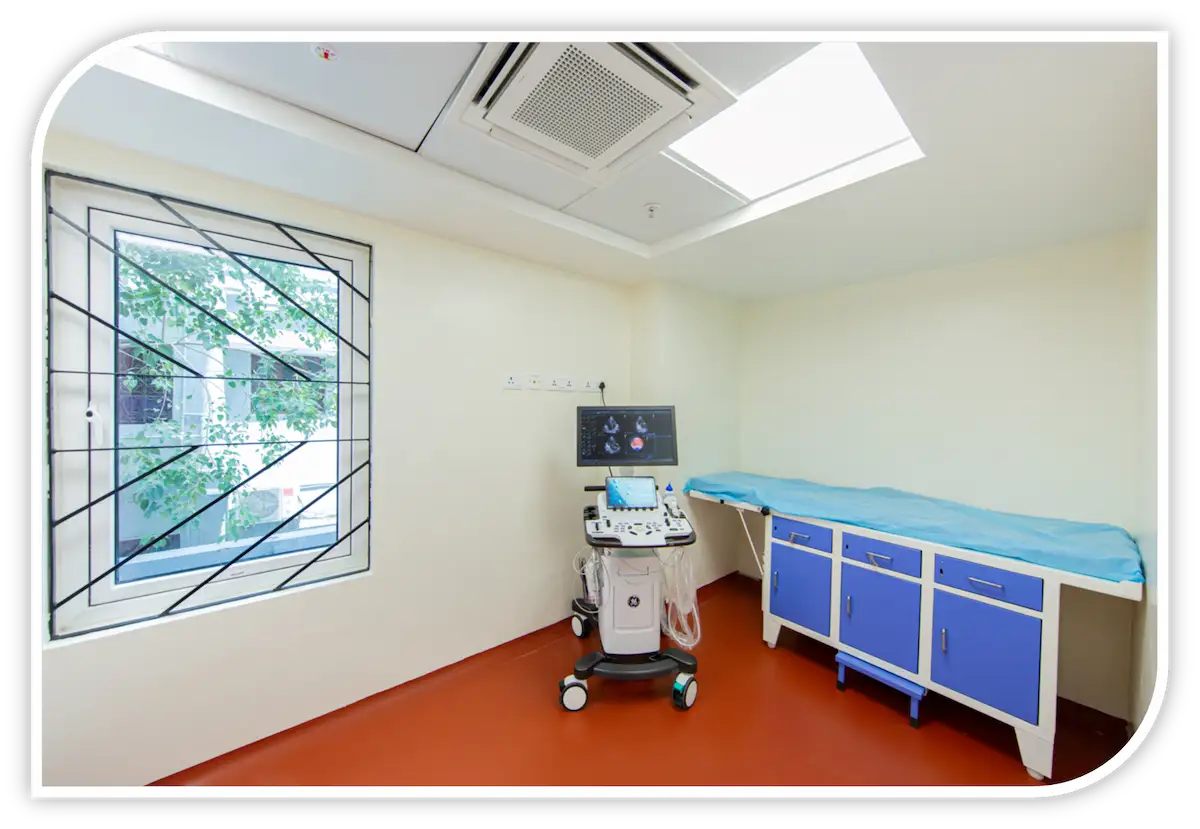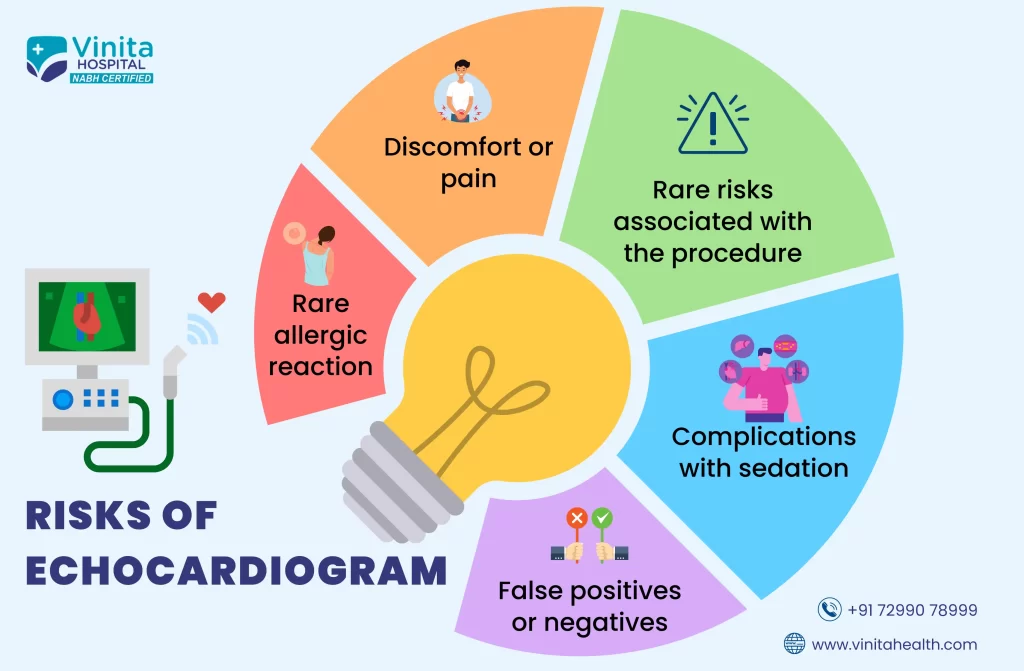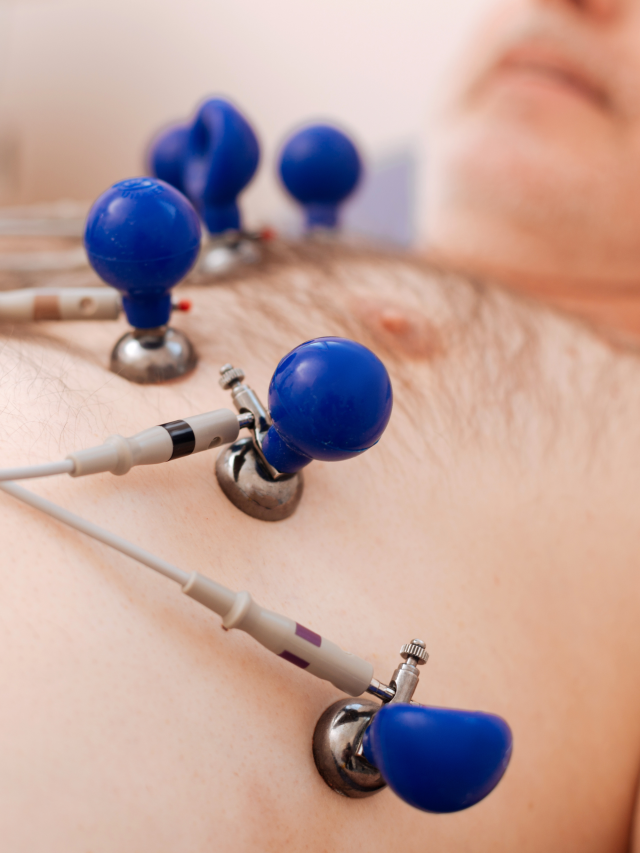Echocardiogram

Overview
Types
Purpose
Technology
Our Doctors & Specialists
At Vinita Hospital, we offer state-of-the-art echocardiogram in Chennai using cutting-edge technologies and machines. We make use of up-to-date techniques to efficiently and quickly assess a patient’s heart function.
Our highly trained and experienced cardiac sonographers work closely with our doctors to achieve the best outcome for your health. With our echocardiogram in Chennai services, you can be assured of accurate and reliable results that help diagnose and monitor heart conditions. Contact us to schedule an echocardiogram appointment in Chennai.
We budget-friendly echo test price Chennai without compromising efficiency and quality and also include color doppler to get better quality results.
What is Echocardiogram?
Echocardiogram is a special diagnostic test that aids in creating a live image of the human heart. It uses sound waves in order to create the heart’s live image on a computer. These live images are known as echocardiogram. The echocardiogram in Chennai allows the physicians to diagnose the size and shape of the patient’s heart.
Moreover, it is easy to monitor if the different sections and valves of the heart are functioning properly or not. This efficient diagnostic test evaluates the blood flow inside the heart as well. The echocardiogram process is painless and it is done to check if there is any existing damage or functioning in our heart.
Types of Echocardiogram in Chennai
The kind of echocardiogram or echo test a patient receives depends on what the doctor suggests. The echocardiogram in Chennai is done to know about your heart health. A sonographer will usually perform the test and report the findings to your healthcare provider.

- Transthoracic Echocardiogram (TTE) – During this non-invasive test, the sonographer will move a transducer or probe over the patient’s skin. That information relays back to the machines to aid doctors to understand how well your heart works.
- Transoesophageal Echocardiogram (TEE) – In this echocardiogram in Chennai, the patient will be partially sedated in a relaxed, calm state. A flexible tube will be inserted into the patient’s throat to allow the cardiologist to view the smaller structures of the heart in more detail.
- Stress Echocardiogram – Your sonographer will capture images of the heart before and after you ride an exercise bike or use a treadmill to elevate your heart rate. If exercise is not appropriate for you, our experts will give you medicine to slowly and temporarily increase your heart rate. At different stages, the sonographer will take several sets of images to see how well the patient’s heart is squeezing and functioning.
The entire procedure of echocardiogram in Chennai is related to the functional system and monitoring process of the heart. So, its vital activity is to diagnose any kind of damage or disorder of the heart. Vinita Hospital provides echocardiogram services for the following purposes:
- Detect if there is any damage or abnormalities that exist on the wall of the heart.
- Observation if the pumping speed of the heart is normal.
- Detect aortic stenosis.
- Checking the blood flow through the different arteries and valves of the heart.
- Diagnosing the coronary artery disease.
- Cardiomyopathy.
- Detects congenital heart disease, pericardial disease.
- Detects infective endocarditis, cardiac tumour.
- Diagnosing if there are any existing heart complications in the unborn child (During the pregnancy of the woman).
- Check for the thickness of the heart.
- Check if there are any blood clots, swelling, or fluids around the heart.
- Evaluate the condition of the heart before and after the surgery.
Several techniques are used to create pictures of your heart during the echocardiogram in Chennai. The best technique depends on a patient’s specific condition and what your healthcare provider needs to see. These techniques include:
- Two-Dimensional (2D) ultrasound
- Three-Dimensional (3D) ultrasound
- Color Doppler ultrasound
- Doppler ultrasound
- Strain imaging
- Contrast imaging
Echocardiogram in Chennai is a major test that can reveal a lot about the heart’s structure and function. If your healthcare provider recommends an echo for you, you should ask your doctor what type you’ll be receiving and what you can expect after the test. You may require more than one echo or multiple tests with varied techniques, so it will be helpful for the physician to get enough details about your heart.
Our collaborative team at Vinita Hospital provides an affordable echo test price Chennai where our experts will understand your medical condition if it is a complex and critical case and recommend a comprehensive treatment plan accordingly. During emergency conditions, our specialists here take timely and well-informed decisions with a thorough due diligence approach.
Overview
Types
Purpose
Technology
Our Doctors & Specialists
Frequently Asked Questions
Yes, an echocardiogram is a safe and non-invasive procedure. It does not involve any radiation or injections, making it a low-risk test. During an echocardiogram, high-frequency sound waves are used to create images of the heart, which are then interpreted by a doctor or a specialist in cardiac imaging. The procedure is painless, and there are no known side effects or risks associated with it.
The duration of an echocardiogram depends on the type of exam being performed and the complexity of the heart condition being evaluated. A typical transthoracic echocardiogram, which is the most common type of echocardiogram, takes between 30 minutes to one hour to complete. However, more complex exams, such as transesophageal echocardiograms or stress echocardiograms, may take longer to perform, up to two hours in some cases.
There are several benefits of getting an echocardiogram, including:
- Early detection of heart disease
- Accurate diagnosis of heart conditions
- Monitoring of heart function
- Non-invasive and low-risk
- Personalized treatment plans
- Peace of mind
Overall, echocardiograms are an important tool in the diagnosis and management of heart disease, and they offer numerous benefits to patients who may be at risk for heart conditions.
The echo test (echocardiogram) and ECG (electrocardiogram) are two different medical tests that serve different purposes in evaluating heart health.
An ECG is a simple and non-invasive test that records the electrical activity of the heart. It is typically used to detect and diagnose various heart conditions, such as irregular heart rhythms, heart attacks, and abnormalities in the heart’s structure. It provides valuable information about the heart’s electrical activity but does not directly show images of the heart.
The choice between an echocardiogram (echo) and a magnetic resonance imaging (MRI) scan depends on the specific diagnostic needs and the information required by the healthcare provider. Both tests have their own advantages and are used in different situations.
An echocardiogram is a non-invasive test that uses ultrasound technology to produce real-time images of the heart. It provides valuable information about the heart’s structure, size, and function, including the pumping ability, valve function, and blood flow patterns.
Echocardiograms are commonly used to assess conditions such as heart valve abnormalities, heart muscle function, congenital heart defects, and certain types of heart disease. They are readily available, less expensive than an MRI, and can be performed quickly at the bedside or in the clinic.


